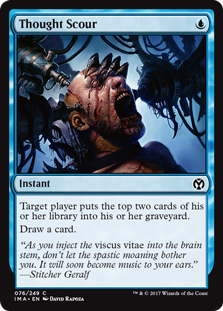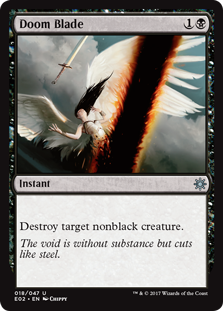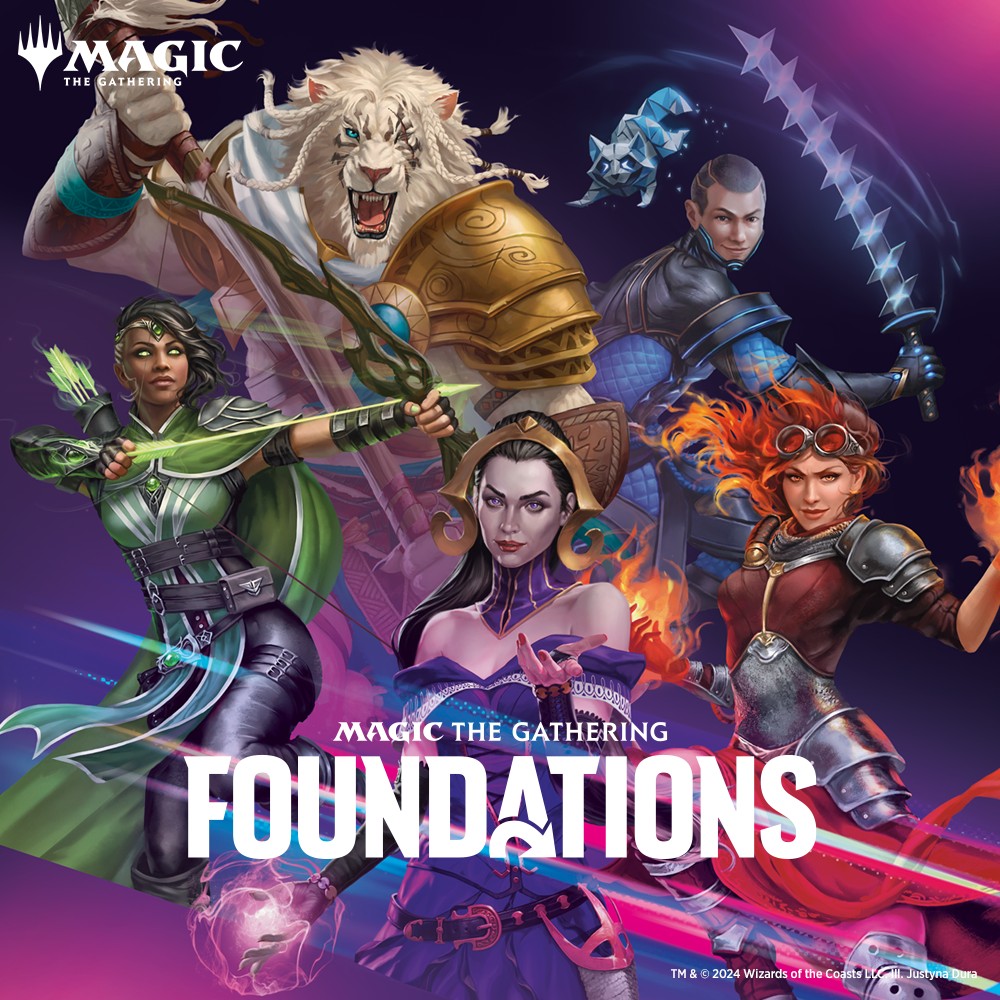I’m back today with a list that isn’t Standard Mono-Blue Tempo. Finally.
Today we’re talking about Blue Black Delver of Secrets. While still a tempo deck, it's vastly different than what we've looked at before. Our last deck was lots of threats and some disruption, with a pinch of card selection for garnish. This deck is the exact opposite: card selection first, enough disruption, and a few threats thrown in. ‘Cause winning the game is good, I guess.
Like with most tempo decks, the goal here is to disrupt your opponent while killing them with efficient threats. The reason this Delver deck plays black rather than mono-blue is its main threats: Gurmag Angler, Delver of Secrets, and Augur of Bolas. The rest of the deck is cantrips (Preordain, Brainstorm, Gitaxian Probe) and disruption, either in the form of counterspells or removal.
One of the signatures of the deck is spells that have alternate costs (Daze, Foil, Snuff Out, Gitaxian Probe, Gush, Gurmag Angler). This is the spikiest deck in Pauper right now, but you might also like it if you're a fan of tempo decks.
Tips and Tricks
• Once you Brainstorm, you can use one of your seven fetchlands, (Evolving Wilds, Terramorphic Expanse, Ash Barrens) to shuffle away the cards you don’t want.
• You can Brainstorm on your upkeep with a Delver of Secrets trigger on the stack and put an instant or sorcery on top of your library to flip Delver.
• You can Gush or Daze in response to a spell to give yourself an island to discard to Foil.
• Thought Scour is used for milling yourself to make Gurmag Angler cheaper.
• Don’t be afraid to cast Gitaxian Probe, Gush, Snuff Out, Foil, and Daze for full price. Out of these five, Foil and Daze are the most punishing to cast for their alternate cost compared to their normal cost.
• You can use Thought Scour to mill away the cards you put on top of your library with Brainstorm.
• Always tap any untapped lands you are going to pick up with Daze or Gush, even if you have nothing to cast with that mana. You might draw something, or you can at least bluff having something.
Delver of Secrets can often be a 3/2 flying attacker on turn two if you set up the top of your library with Brainstorm or Preordain. Delver is exceptional in a tempo deck because it’s an efficient creature with evasion, meaning it can deal all 20 damage if you disrupt your opponent enough.
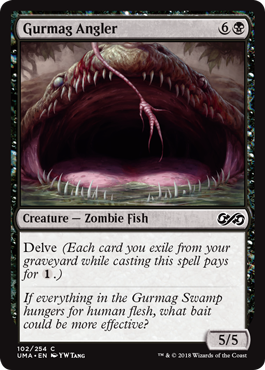
Gurmag Angler is the other main threat in the deck. It doesn’t have evasion, but it's so big that it doesn’t need it. It is also a great blocker and will often prevent your opponent from attacking at all. Unlike Delver of Secrets, it doesn’t get killed by Lightning Bolt or Galvanic Blast, thought still gets killed by Journey to Nowhere and is way more work to cast.
Daze is one of the best cards in the early game and the absolute worst late game. Early on, you're happy to pick up Land to get rid of a spell. Plus if your opponent spends the game always leaving one mana up, you can still get them with the double Daze, and they’ll probably cost themselves enough tempo to give you a better chance of running them over. Late game, even triple hard-casting Daze won’t get your opponent, unless they’re really mana-screwed. By that point you may as well Brainstorm Daze away.
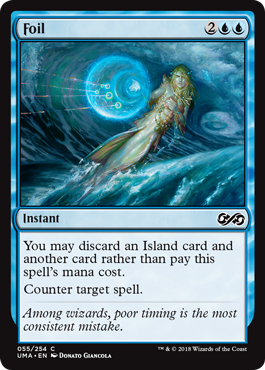
Foil has a crazy amount of card disadvantage, but it is the closest thing to Force of Will you’re going to get in Pauper. This is one of the spells that you want to hard cast rather than use its alternate cost. Even though it has card disadvantage, it isn’t so bad if you’re discarding lands, and it's a great way to fill your graveyard for Gurmag Angler.
Gush is a massively under-costed Divination in this deck. Since most of your deck costs one or two mana, you won’t mind picking up two lands, especially since you only have seventeen lands and won’t be hitting your land drop every turn.
Gush is also great at filling your hand for Foil. One trick for using this card is that there is almost no reason to cast it picking up islands on your opponent’s end step. Untapping with them lets you tap them an additional time before you pick them up. You might still want to cast Gush during your opponent’s turn in response to something (to get it out of your hand for Duress, to dig for a Counterspell, or to fill your hand for Foil).
Snuff Out is the Doom Blade of this deck. The four life isn’t actually too much of a problem since, again, this is very much a tempo deck we're working with. You shouldn't care if you just discarded your hand to Foil, picked up half of your lands with Gush and Daze, and are below five life because of Snuff Out as long as you kill your opponent first.
Tournament Report
I ran this list at a tournament at Wizard’s Tower recently and went 2-1-1. This is a quick recap of how that tournament went and why you should always eat lunch.
The card images shown below are what I sideboarded, not necessarily what is correct to sideboard. If I feel I didn’t sideboard well, I’ll go over what I should have done instead.
Boros Bully/Tokens
In:
Out:
I won the first game of this matchup through about a dozen Prismatic Strands, though I lost the second game because I sideboarded out too many threats. I think I would have lost the third game that way eventually, but we went to time before anybody got too close to winning.
I brought in Dispel for Lightning Bolt, Galvanic Blast, Prismatic Strands, and Rally the Peasants. Echoing Decay and Shrivel were in there to deal with tokens.
Relic of Progenitus is an interesting choice. I decided that I would rather get rid of flashback cards and Sacred Cats than have a cheap Gurmag Angler. My opponent pointed out that Battle Screech will often be flashed back the turn it is cast from hand, which is true, but there are enough other flashback cards in the deck that I’m happy with my decision to bring in Relic. I took out Snuff Out because four mana or four life is an expensive way to kill a token.
I took out Delver of Secrets because it gets killed by all the bolts. I took out Gurmag Angler because it is a lot of work to cast just to draw out Journey to Nowhere. Thought Scour is only in the deck to make Gurmag cost less, so it came out, too.
I think if I faced this matchup again, I wouldn’t take out Gurmag since it's a solid blocker, assuming I remember this match (there is a chance that I would completely forget about this and do the exact same thing again).
Mono-Blue Delver
In:
Out:
I won the first game, although I was getting kind of annoyed by the end of it. Every time I cast a Gurmag Angler, my opponent would Snap it.
I Gushed myself into oblivion looking for an answer in the second game. I think it was for Spire Golem, but I honestly can’t remember. As for the third game, I mulliganed to six and my opponent mulliganed to five. I went first, played a cantrip, and passed the turn holding Daze. My opponent cast Preordain and looked at me. I looked at him said, “You don’t have the second land,” and Dazed his Preordain.
He didn’t have the second land. And he didn’t get it for roughly ten turns. But I couldn’t capitalize on this because I was mana-screwed as well, though to a lesser extent. I managed to eventually win because I had more mana to sculpt my hand. I held onto my Stormbound Geists because I was pretty sure he had Daze.
Gurmag Angler came out because I was tired of having it bounced constantly. Daze came out because of the lack of non-1-drops. Echoing Decay and Shrivel are for the absurd number of faeries I had to face. Dispel is to counter counterspells. Stormbound Geist is a great way to deal with Insectile Aberration and faeries.
Bogles (suck)
In:
Out:
I countered my opponent's important early spells in the first game, only to not draw a single threat and have him draw one more Bogle than I had counterspell.
I died, and it sucked.
I coulda shoulda woulda lost the second game according to my opponent. He thought it was good luck for me that I drew Diabolic Edict on the last possible turn before I would have died. I think it was bad luck that I drew it as late as I did given how much I filtered. The third game went the same way: on the last possible turn, I drew Diabolic Edict.
I play against Bogles almost every tournament (one of the regulars always plays Bogles because he doesn’t like playing anything that involves interaction or thinking), so I have a solid sideboard plan against it.
I bring out Dispel and all my removal except for one Snuff Out. I leave it in because Aura Gnarlid is a beating. I bring in Diabolic Edict because it is one of the only ways to get rid of a Slippery Bogle. I bring in Shrivel because the Bogle deck will normally have extra Bogles or tokens and they can sacrifice those to Edict, which wrecks you. Stormbound Geist comes in just because it is a threat which is better than removal in this matchup.
Affinity
In:
Out:
Story time, kids.
The day of the pauper tournament I got up at 9:30, as teenagers do. I was leaving for the tournament at 12:30, so I would normally eat lunch and therefore not need to bring food. But since I had a late breakfast, I didn’t eat lunch. By the last round, I was drained. Something about getting all my protein for the day from a glass of milk or two. All I remember is Atogs doing bad things and me being extremely tired.
I lost in two games. I don't think this that bad a matchup, but it isn’t great either.
I brought in Hydroblast and Dispel to deal with Galvanic Blast, Temur Battle Rage, and Fling. Hydroblast is slightly better than Dispel because it destroys Atog as well as countering spells. Doom Blade came in to deal with Atog and kill random 4/4s. The cards I brought out probably should come out, but I can’t remember my thought process when I was taking them out.
That’s all for today. War of the Spark is spoiled, so next article we’ll definitely be talking about it (in case you were wondering, my favourite card in War is probably the Jace). Thanks for reading.




